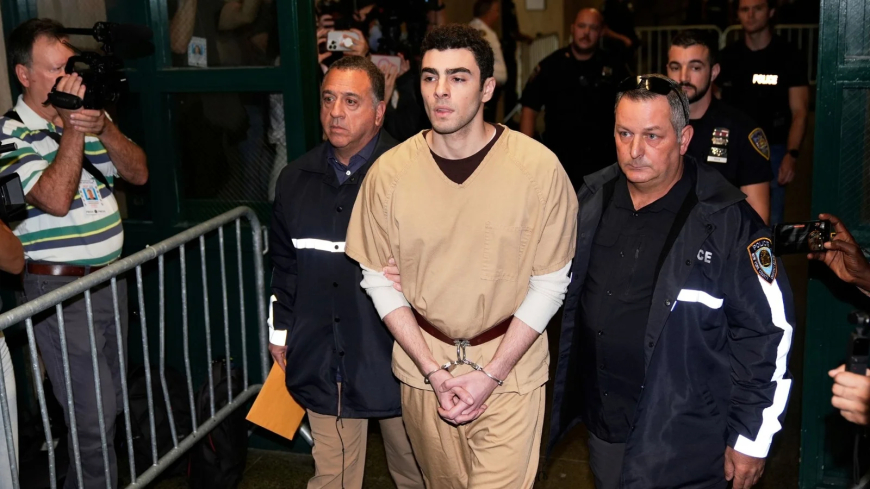Judge Tosses Terrorism Charges Against Luigi Mangione in UnitedHealthcare CEO Killing
Judge in New York dismisses terrorism charges against Luigi Mangione in the killing of insurance exec Brian Thompson, but second-degree murder and other counts remain.

ChatGPT said:
Here’s a detailed, SEO-optimized article on Luigi Mangione and the recent court decision dismissing terrorism counts, based on verified reporting.
Judge Tosses Terrorism Charges Against Luigi Mangione in UnitedHealthcare CEO Killing
By Ronald Kapper
New York, September 16, 2025 — A New York judge has dismissed two state terrorism-related charges against Luigi Mangione in the December 2024 killing of UnitedHealthcare executive Brian Thompson, a ruling that removes some of the highest potential penalties from the case but leaves serious charges still in play.
What Happened
-
On December 4, 2024, Brian Thompson — former CEO of UnitedHealthcare — was shot outside a Midtown Manhattan hotel, where he was attending an investor conference.
-
Luigi Mangione, 27, was arrested five days later in Altoona, Pennsylvania. Authorities say he used a 3D-printed weapon, was carrying fraudulent identification, and authored writings indicating ideological motives.
-
Prosecutors charged Mangione with multiple counts — including first-degree murder in furtherance of terrorism under New York state law. The terrorism charges alleged he acted not only to kill but also to intimidate health-insurance workers or influence government policy.
The Court’s Decision
-
On September 16, 2025, Judge Gregory Carro ruled that the evidence presented was legally insufficient for the terrorism counts. The judge determined that prosecutors had not demonstrated that Mangione’s motive or actions met the required legal standard of New York’s terrorism statute. Specifically, there was not enough proof that he intended to intimidate or coerce a civilian population or affect government policy through violence.
-
Carro kept intact other significant state charges, including second-degree murder, which requires proving intent to kill but not that the act was terrorism. Additionally, charges like criminal possession of weapons and false identification remain.
What Charges Remain
-
Second-degree murder under state law.
-
Multiple weapons possession charges.
-
False identification charges.
-
A parallel federal murder indictment, which carries the possibility of the death penalty.
The state case’s next hearing is scheduled for December 1, 2025, while the federal proceedings continue independently.
Legal Implications
-
This ruling narrows the legal focus on proving motive and intent rather than ideology alone. The distinction matters: under the law, a killing motivated by anger or animus toward a group does not automatically constitute terrorism unless specific legal elements are met.
-
The decision also underscores the complexity of prosecuting so-called ideological or political crimes. Judicial precedent and the statutory definitions matter deeply; ambiguous or broad language in terrorism laws often faces challenge in court.
-
Prosecutors are still seeking severe punishment under the remaining charges. Even without the terrorism enhancements, second-degree murder in New York carries serious penalties, potentially 15 years to life.
Public and Political Reactions
-
The case has drawn intense public attention, partly because of Mangione’s writings criticizing the health insurance industry and broader corporate practices. Some have viewed him as a symbol of opposition to healthcare cost burdens. Others see his actions as violent extremism.
-
Outside the courtroom, dozens of Mangione supporters — many young, many wearing green or shirts reading “Free Luigi” — gathered to cheer the dismissal of the top terrorism charges. These displays reflect the polarized views around the case.
What to Watch Going Forward
-
Trial strategy — With terrorism counts gone, both defense and prosecution will need to sharpen arguments around evidence of intent for the remaining murder and weapons charges.
-
Federal case development — The federal charges are unaffected by the state court’s decision. Federal authorities are still pursuing a murder indictment which may include death penalty considerations.
-
Evidence rulings — One key point will be whether the court admits Mangione’s writings, diary entries, or other materials that prosecutors say reveal ideological motives. Defense has raised challenges around legality and relevance.
-
Sentencing possibilities — Even without terrorism charges, if convicted of second-degree murder, Mangione faces a potential sentence of life in prison (or similar heavy penalties under state or federal law).
Tags:
What's Your Reaction?
 Like
0
Like
0
 Dislike
0
Dislike
0
 Love
0
Love
0
 Funny
0
Funny
0
 Angry
0
Angry
0
 Sad
0
Sad
0
 Wow
0
Wow
0







































